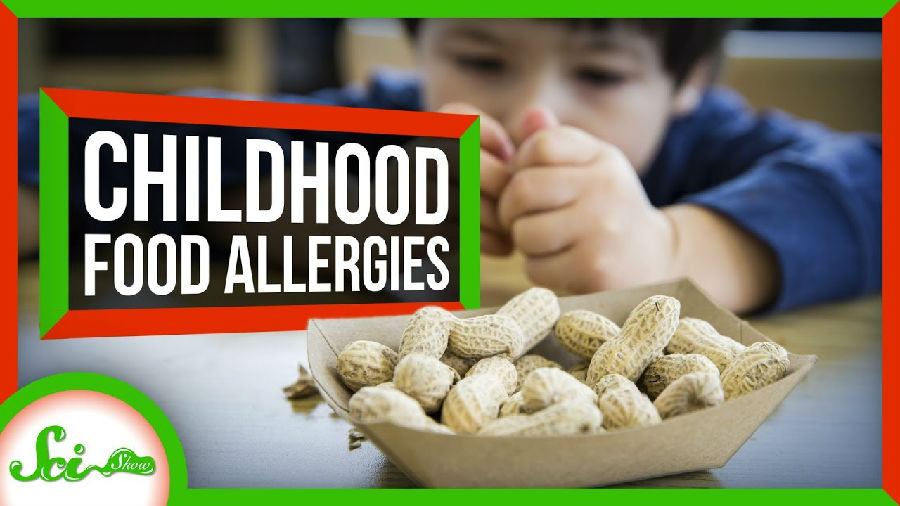As a parent, it sometimes feels like you have a lot to worry about.
作为父母,有时候你会觉得有很多事情要担心。
And if your kid happens to have food allergies, that can make things even more complicated.
如果你的孩子恰好食物过敏,事情就会变得更加复杂。
Like, not only do you have to keep them away from electrical outlets and busy streets,
比如,你不仅要让他们远离插座和繁忙的街道,
but you also have to keep them far away from foods like peanuts, shellfish, milk, and eggs.
还要让他们远离花生、海鲜、牛奶和鸡蛋等食物。
After all, symptoms like a tingling or itchy mouth, hives, and difficulty breathing can quickly balloon into a life-threatening emergency.
毕竟嘴角刺痛或瘙痒、起疹子和呼吸困难这些症状会迅速恶化成威胁生命的紧急情况。
Basically, childhood food allergies are no joke. So it might make you cringe to learn that, not long ago,
儿童食物过敏可不是儿戏。所以这或许会让你不敢了解,就在不久前,
doctors were making recommendations about them we now believe were totally backwards and could even have made things worse.
那些医生关于过敏建议,在我们现在认为是倒退的,甚至会让事情变得更加糟糕。
But how did we misunderstand this so badly?
但我们是如何严重误解食物过敏的呢?
This all started in the mid-1990s, when the number of kids with food allergies was on the rise.
一切都要从20世纪90年代中期说起,当时儿童食物过敏人数增加。
So the medical community raised the alarm, searching for ways to prevent these allergies from happening.
所以医学界发出了警报,寻找预防过敏的方法。
One approach came in 2000, from the American Academy of Pediatrics.
2000年美国儿科学会提出一种方法。
They started recommending that people not give some of the most common allergenic foods to kids
他们开始建议人们,不要给高过敏风险的孩子
who had a high risk of allergies until they were a little older.
吃一些最常见的过敏食物,等他们稍大一点的时候就可以吃了。
That meant no milk until after a kid was 1, no eggs until age 2, and no peanuts or seafood until age 3.
这意味着小孩子一岁前不能喝牛奶;两岁后才能吃鸡蛋;三岁后才能吃花生或海鲜。
These guidelines were mostly based on experts' hunches, but there were a few studies to back them up.
这些建议基本上都是基于专家们的预感,但并没有什么研究依据。
For example, there was one from 1990 that followed a group of children in New Zealand until they turned 10.
例如,有一项1990年的研究,追踪一组新西兰儿童直到10岁。
It found that, if kids were given a full diet of diverse allergens before they turned 4 months old,
研究发现,如果在孩子四个月前给他们吃富含多种过敏原的食物,
they were more likely to have recurrent or chronic eczema, which often goes hand in hand with food allergies.
他们更有可能出现经常性或慢性湿疹,这通常和食物过敏有关。
Similarly, a 1994 study looked at 113 Finnish children whose parents had food allergies.
同样,一项1994年的研究观察了113名芬兰儿童,这些孩子的父母都有食物过敏。
And it found that at age 5, food allergies were significantly more common in kids
其发现在5岁的时候,食物过敏在那些在三个月大就食用
that started solid foods at 3 months old than those who started solids later.
固态食物的儿童身上明显更常见,相比之下稍晚开始吃固态食物的没那么常见。

In 1999, there was even a formal report supported by leading European medical societies
1999年,甚至有一篇主要由欧洲医学协会支持的正式报告
that suggested that introducing solid foods before 5 months could increase the risk of food allergies.
表明在儿童5个月大的时候给他们吃固态食物会增加食物过敏风险。
Over time, more and more medical societies began to agree that yes,
随时间流逝,越来越多医学协会开始同意这一观点,
doctors should keep advising parents to put off feeding allergenic foods to their babies.
医生应该建议父母推迟给宝宝喂食过敏食物。
But then, starting around 2006, studies started coming out suggesting the exact opposite.
但现在,大概从2006年开始,研究开始表明,事实恰恰相反。
There don't seem to have been any flaws in the older studies that scientists can put their collective finger on.
似乎科学家们没有在过去的研究中发现任何漏洞。
Nevertheless, the data began to reflect a different perspective.
但数据开始反映出了一种不同的观念。
For instance, a study published that year that followed more than 1600 children from birth to age 5.
例如,那一年发表的一项研究对1600多名刚出的儿童进行追踪直到5岁。
It found an increased risk of having a wheat allergy in kids who started eating wheat later after 6 months of age.
该研究发现,6个月以后才开始吃小麦的孩子患小麦过敏的风险更高。
The emerging data soon came to a tipping point and, in 2008, the American Academy of Pediatrics reversed their stance.
新兴数据很快就达到了引爆点,在2008年,美国儿科学会改变了他们的立场。
Again, other leading health and medical institutions followed suit.
其他领先的卫生和医疗机构再次纷纷效仿。
They issued guidelines for introducing the most common allergenic foods
他们提出建议,一旦婴儿表现出可以处理固态食物的迹象
as soon as babies showed that they could handle solid food, which typically happens at 4 to 6 months old.
就给他们食用最常见的过敏食物,通常是在4到6月大的时候。
And if you're wondering why the data pulled a one-eighty, so are the experts.
如果你想知道为什么数据发生180度大转弯,专家们也想。
Doctors don't quite understand why earlier studies suggested a benefit to delaying allergenic foods.
医生们不太明白为什么早期的研究表明推迟食用易过敏的食物是有益的。
But more and more research shows that they were totally wrong.
但是有越来越多的研究表明,早期研究完全是错误的。
For example, the 2015 Learning Early About Peanut trial showed that introducing peanut protein early is actually a good thing.
例如,2015年了解花生早期试验表明早期食用花生蛋白是件好事。
And the 2016 Enquiring About Tolerance study also found it was safe to introduce a handful of allergenic foods to infants under 6 months old.
2016年EAT研究也发现给6个月以下的婴儿食用少量致敏食品是安全的。
So there's plenty of evidence to back up the reversal of previous guidelines.
因此,有充足的证据支持推翻之前的指导方针。
Unfortunately, though, there still isn't a whole lot of specific advice when it comes to actively preventing food allergies across the population.
但说起主动预防食物过敏,仍然没有更多的具体建议。
Studies so far have looked at variables like exactly how much of each allergen to introduce to babies and how often.
到目前为止,研究人员对各种变量进行了研究,比如每种过敏原究竟需要向婴儿引入多少,以及引入的频率。
They've also studied whether those recommendations should differ based on geographical location,
他们还研究了这些建议是否应该根据地理位置而有所不同,
and whether the same advice applies to infants with and without risk factors that predispose them to developing food allergies.
以及同样的建议是否适用于有或没有易使婴儿发生食物过敏危险因素的婴儿。
But there isn't enough evidence yet to translate those studies into real recommendations for parents.
但目前还没有足够的证据可以将这些研究转化为给父母的真正建议。
That's going to take more research like more studies into how factors other than when you first eat a food affect whether you develop an allergy.
这还需要进行更多的研究,例如更多的研究过敏因素而不是你第一次食用某种食物会否影响你食物过敏。
And more studies that aren't just about peanuts.
也不能仅仅是关于花生的研究。
One thing's clear, though: That old advice to delay infants' exposure to allergenic foods
但有一件事是明确的:延迟婴儿接触过敏食物的老建议
still has a hold on the parenting world, and not everyone is totally caught up on the latest guidelines.
在父母界中仍有一席之地,并不是每个人都能得到最新指导方针的消息。
Thankfully, the most up-to-date recommendations do tell parents not to bother delaying common allergens like wheat and peanuts.
还好,最新的建议确实告诉父母们不要推迟常见的过敏原,如小麦和花生。
Instead, they say to start introducing plenty of different foods as soon as your baby is ready for them.
相反,建议指出,只要你的宝宝准备好了,就可以吃各种不同食物了。
But when it comes to your individual kids, don't take it from us,
但当涉及到你自己的孩子时,不要问我们
and definitely don't take it from random strangers on the internet parenting forums.
也绝对不要寻求父母论坛上陌生人的建议。
If you're really concerned about food allergies in your kids, consult a pediatrician.
如果你真的担心孩子的食物过敏问题,去问问儿科医生。
Thanks for watching this episode of SciShow.
感谢收看本期《科学秀》。
We couldn't make smart, free videos like this without the help of our supporters.
没有各位支持者的帮助,我们无法制作这些机智免费的小视频。
To learn more, check us out at patreon.com/scishow.
点击patreon.com/scishow,了解更多。


